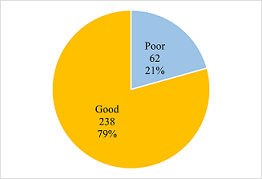Assessment of Knowledge and Rate of Service Uptake of Community Based Health Insurance among Traders in Akpan Andem Market, Uyo, Akwa Ibom State, Nigeria

Abstract:
Keywords: Community Based Health Insurance, Community Involvement, Voluntary, Health Risk, Regressive Financing, Inferential Statistics, Knowledge Level, Service Uptake.References:
[1] Zoidze A,
Rukhazde N, Chkhatarashvili K, Gotsadze G. Promoting universal financial protection:
health insurance for the poor in Georgia – a case study. Health Res Policy Syst.
2013 Nov 14;11(1):45.
[2] Rodin J,
de Ferranti D. Universal health coverage: the third global health transition? The
Lancet. 2012 Sep;380(9845):861–2.
[3] Collins, D., February 2015. Assessment of Akwa Ibom Community-Based Health
Insurance (CBHI) Pilot Scheme. PLAN-Health Project. Management Sciences for Health.
[4]
Cameron TA (1988). A new paradigm for valuing non-market
goods using referendum data: maximum likelihood estimation by censored logistic
regression. J Environ Econ Management, 15(3):355–379. 10.1016/0095-0696(88)90008-3.
[5] Farrugia, P., Petrisor, B.A., Farrokhyar, F., & Bhandari, M. (2010).
Research questions, hypotheses and objectives. Canadian Journal of Surgery, 53 (4),
278-281.
[6]
Stuart
MacDonald & Nicola Headlam (2008). Research Methods Handbook: Introductory guide
to research methods for social research. Centre for Local Economic Strategies Express
Networks • 1 George Leigh Street, Manchester M4 5DL. ISBN: 1870053656. https://www.cles.org.uk/wp-content/uploads/2011/01/Research-Methods-Handbook.pdf.
[7]
Degu, G., & Yigzaw, T. (2006). Research Methodology.
Retrieved from http://www.cartercenter.org/resources/pdfs/health/ephti/library/lecture_notes/health_science_students/ln_research_method_final.pdf.
[8] Donfouet HPP, Essombè EJR, Mahieu P-A, Malin E. (2011)
Social capital and willingness-to-pay for
community-based health insurance in rural Cameroon. Global Journal
of Health Science,3(1):142–149.
[9]
Collins, D., February 2015. Assessment of Akwa Ibom Community-Based
Health Insurance (CBHI) Pilot Scheme. PLAN-Health Project. Management Sciences for
Health.
[10] Smith, Joanna
and Firth, Jill (2011) Qualitative data analysis: the framework approach. Nurse
Researcher, 18 (2). pp. 52-62. ISSN 1351-5578.
[11]
Mack,
N., Woodsong, C., Macqueen, K. M., Guest, G. & Namey, E. (2005). Qualitative
Research Methods: A Data Collector’s Field Guide. Family Health International, North
Carolina, USA.
[12] Yusuf, Hammed et al (2019). Health Insurance Knowledge, Attitude and the
Uptake of Community-Based Health Insurance Scheme among Residents of a Suburb in
Lagos, Nigeria. West African journal of medicine, VL – 36.
[13] Ibukun O. A. (2014) Knowledge and uptake of community-based Health Insurance Scheme among residents of Olowora, Lagos.
[14] Jütting J. (2001). The Impact of Health Insurance on the Access to Health
Care and Financial Protection in Rural Developing Countries. The Example of Senegal.
HNP Discussion Paper (Washington: World Bank).
[15] De Weerdt J (2002) Social networks, transfers
and insurance in developing countries, no. 159. PhD Thesis, Katholieke Universiteit
Leuven, Leuven.
[16]
Desmet
M, Chowdury AQ & Islam MdK (1999) The potential for social mobilisation in Bangladesh:
the organisation and functioning of two health insurance schemes. Social Science
and Medicine 48, 925–938.
[17] Dror DM, Hossain SAS, Majumdar A, Pérez Koehlmoos TL, John D, Panda PK (2016)
What Factors Affect Voluntary Uptake of Community-Based Health Insurance Schemes
in Low- and Middle-Income Countries? A Systematic Review and Meta-Analysis. Plos
One 11(8): e0160479. https://doi.org/10.1371/journal.pone.0160479.
[18] Criel B., Noumou Barry A. & von Roenne F. (2002). Le Projet PRIMA
enGuinéeConkary-uneexpérienced’organisation de mutuelles de santé enAfriquerurale.
(Brussels:Medicus Mundi Belgium).
[19]
Idongesit
L. Silas M. & Edidiong E. (2020). Patient satisfaction with health services
in public and private Hospitals in South-South Nigeria: International Journal of
Research in Pharmacy and Science. Jackson et al. Int J Res Pharm Sci 2017, 7(2);
8 -15. https://www.researchgate.net/publication/338655447_Patient_satisfaction_with_health_services_in_public_and_private_Hospitals_in_South-South_Nigeria.
[20]
Nageso D, Tefera K, Gutema K (2020) Enrollment in community-based
health insurance program and the associated factors among households in Boricha
district, Sidama Zone, Southern Ethiopia; a cross-sectional study. Plos One
15(6): e0234028. https://doi.org/10.1371/journal.pone.0234028.

